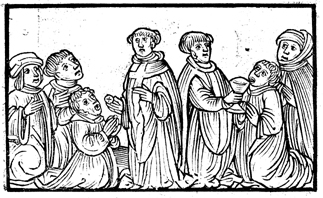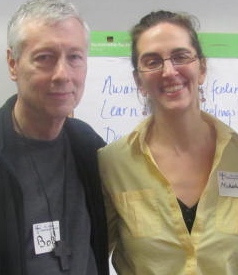The Sanctification of All
 Clergy Conference
Clergy Conference
Diocese of Georgia
September 28 – 30, 2014
We are to be transformed, consecrated, made sacred to his creative purpose; and so fulfill the meaning of our life. Evelyn Underhill
Follow up resources
The Sanctification of All: Taking Responsibility for Your Spiritual Life - Packet for use with partcipants
The Sanctification of All: Parish Educational Design - Ideas about how to use the process in the parish
Coaching for use in your parish
For those that participated in the clergy retreat Michelle and Bob will provide a limited amount of coaching on the use of Sanctification of All without charge. The coaching will be by e-mail. You mat take advantage of that between now and October 21. After the 21st if you want coaching you'll be charge a fee. Contact us if interested - Michelle Heyne - Bob Gallagher
Related Quickening Resources
Evaluation Notes
We received about 20 completed forms and a number of comments by those needing to leave after the morning session. The written evaluations were 85% high end satisfaction and 15% low end. Mostly 5s and 6s on a six point scale. This was on both scales - usefulness in yoiur own spiritual life and understanding how to use this in the parish.
Here's what we heard
- The total process was useful for most people. Allowed us to do what we would do with lay members.
- For some the initial interview process was rather significant in naming issues they wanted to address, for self awareness.
- Many found the Shape of the Parish model very helpful, very practical, especially the impact of developing a critical mass of people engaging responsibility for their spiritual life.
- The quickening discussion was useful
- Several already had plans for using the processes in relation to mid week liturgies.
- Several found the Renewal - Apostolate work in Monday afternoon important. One person had a hard time understanding it.
- Several liked the connection made about the relationship between clergy spiritual health and that of the baptized.
- Some clergy came exhausted and really needed time to sleep and rest.
- One person said she heard a few clergy unhappy about having to do the interviews themselves. Our hope is that no one would consider attempting to conduct this kind of program with other people if they had not gone through it themselves.
- There was one person that thought the Monday work should have been specially crafted for clergy. Our view is that it is at the heart of Anglican tradition to see an essentially common life of spiritual practice for clergy and laity.
- We heard second hand about a few clergy that were unhappy being asked to participate in a workshop style program, especially one that involved them in looking at their own spiritual life. We found ourselves wondering if they had not read the advance web page (see below) on the retreat or had read it but somehow thought it made sense to come participate in a program that wasn't what they wanted and then to complain about it. We also questioned if our description was adequate for those clergy to understand what would happen at the retreat or was available soon enough.
The schedule
--------------------------------------------------------------------------------
Advance information and resources - Material provided prior to the retreat
Outcomes we seek
1. A process you can use in the parish to increase the number of people with an intentional spiritual discipline and an increased sense of responsibility for their spiritual life. This can also have the effect of grounding the entire parish more deeply. It's a process of moving from interviews about spiritual life, to a group conversation about the interviews, to an opportunity to reflect on and revise your spiritual discipline.
2. An opportunity to reflect on and make needed changes to your own spiritual discipline while using an abbreviated form of the process in #1
3. A better grasp of the dynamics of change in the parish church.
The Learning Process
The clergy use the same process that can be used in the parish. We will interview one another about our spiritual life. We will reflect on that. We will examine and as needed revise our current spiritual discipline.
The "feel" of Monday's work is a that of a participatory spiritual retreat. You are really attending to your spiritual life. It is about you! That shifts on Tuesday as we focus on how to use it in the parish.
On Tuesday we will reflect on the experience we've gone through on Monday and look at ways to use it in the parish. That will included noting variations. Pastoral theology and intervention theory models will be presented.
Shaping the Parish
We’ll spend a very brief time testing interest in a “graduate” program for those that have done CDI. For information on Shaping the Parish
Advance Readings
If possible, please read the following as background for your time together.
The Process of Change - Thoughts on the process of change in a parish church.
Shape of the Parish Model A two page summary of the model offered in Fill All Things: The Spiritual Dynamics of the Parish Church, Robert Gallagher
Power from the center pervades the whole And an insert used as background
Follow up
After the conference we will post material at this location for your use in the parish. It will include: 1) Material to use with parishioners and 2) Material for leaders of the process
Workshop Leaders
Bob Gallagher and Michelle Heyne - About Bob & Michelle
